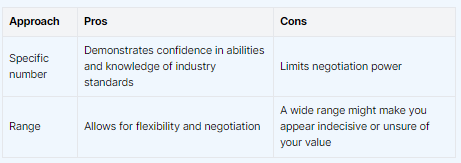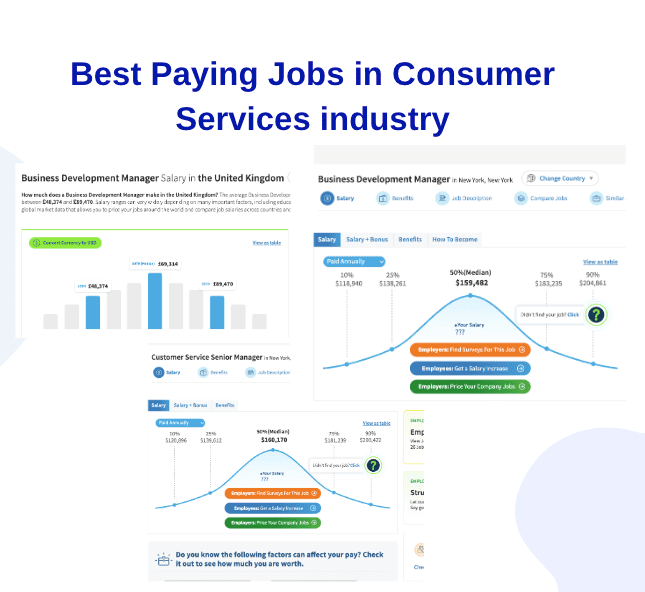How to Answer the Interview Question: What Are Your Salary Expectations? + 5 Powerful Examples

Job interviews can be stressful, and one question that often causes anxiety is “What are your salary expectations?” Most people are hesitant to talk about money, and naturally discussing your compensation expectations is even more difficult than some of the other common questions.
If you ask too much, you could outprice yourself. If you ask too little, then you leave a lot of money on the table. How do you identify the fair salary range and discuss salary expectations confidently?
Here are some helpful job interview related blogs
- Tackling the final interview round
- How to answer ‘tell me about yourself’
- What are your career aspirations
- Why do you want this job
- Why should we hire you
- What are you passionate about
- Walk me through your resume
- How do you handle stress and pressure
- What are your goals
- Strengths and Weaknesses In Interview
- Interview questions for managers
- Interview questions for freshers
- Tips to succeed in a job interview
- Do you need a Career coach / Interview coach?
We are here to help. In this post. we’ll discuss how to research industry standards and company culture, determine a realistic salary range, highlight your skills and achievements, delay discussing salary, and be open to negotiation. By the end of this post, you’ll feel more confident in handling the question about your salary expectations and be better equipped to negotiate a fair salary for your next job.
Highlight Your Skills and Achievements (before you get this question)
Before you get into the salary negotiations, focus on the value your bring to the company. The more effectively you add these in the responses to the interview questions, the easier the salary negotiation will be. Here are some tips on how to effectively highlight your skills and achievements:
Review the job description. Look at the required skills and qualifications listed in the job description and identify which ones you possess. Then prepare examples of how you have utilized those skills in previous roles.
Quantify your accomplishments. Use numbers and percentages to quantify your achievements and demonstrate the impact you made in your previous roles. For example, instead of saying “I increased sales,” say “I increased sales by 20% through targeted marketing campaigns.”
Use the STAR method. When describing your achievements and past experiences, use the Situation, Task, Action, Result (STAR) method. This framework allows you to tell a story that demonstrates your skills and highlights your achievements.
Highlight transferable skills. Even if you don’t have direct experience in the industry or position you’re applying for, you may have transferable skills that can be applicable. Highlight these skills and explain to your hiring manager how they can be used to benefit the organization.
Be confident but humble. While it’s important to showcase your accomplishments, it’s equally important to remain humble and not come across as arrogant. Be confident in your abilities but also emphasize that you are always looking for ways to learn and improve.
Research Industry Standards and Company Culture

It’s crucial to research industry standards and company culture when answering salary expectation questions in job interviews. To determine a realistic salary range, use online salary websites such as Glassdoor or Salary.com. You can also reach out to professional networks or associations in your field. For researching company culture, check out their website, social media channels, and online reviews to get a sense of their values and work environment.
Reach out to current or former employees to ask about their experiences working at the company. This information will help you determine if the company aligns with your goals and values, and it will give you more confidence when answering salary expectation questions during the interview process.
Pro tip: Imposter syndrome is one of the most common reasons why many candidates go for the minimum salary in the range or starting salary. Convince yourself first before you convince the hiring manager.
Determine a Realistic Salary Range
While researching a realistic salary range is crucial when answering the question about your salary expectations during a job interview. Your salary range should be based on factors such as your experience, qualifications, and the industry standards.
How to Determine a Realistic Salary Range
To determine your salary range, you can start by looking at industry standards and the research you conducted on the company culture. Consider your level of experience and qualifications and how they compare to others in the industry holding similar positions. You can also take into account other factors that might affect your salary, such as the cost of living in the area.
Another approach to determine your salary range is to consider your current salary or salary history. Keep in mind that some states and cities have passed laws prohibiting employers from asking about salary history, so it’s essential to be aware of local regulations.
Once you’ve determined a salary range, it’s important to be prepared to explain how you arrived at that number and why it’s appropriate for the position. Ensure your acceptable salary sits closer to the middle in the desired compensation range.
Specific Number vs. Range

When asked about salary expectations, it’s important to consider the pros and cons of providing a specific number versus a range. Providing a specific number can demonstrate confidence in your abilities and knowledge of industry standards. However, it can also limit your negotiation power. Providing a range, on the other hand, can allow for more flexibility and negotiation.
However, a wide range might make you appear indecisive or unsure of your value. By weighing these factors, you can determine which approach is best suited for your negotiating style and personal preference.
Pro tip: If you think the interviewer is open, ask them for what the budgeted salary range is for this role.
Delay Discussing Salary
Delaying the discussion of salary until later in the interview process or until an offer is made can have several benefits. In some cases, it may be in your best interest to avoid the topic of salary until you have a better understanding of the job requirements and the company’s expectations. Here are some reasons why delaying the salary discussion can be beneficial:
Showcase your skills and value first. By delaying the conversation about salary, you have the opportunity to showcase your skills and value before discussing compensation. This can help you establish yourself as a strong candidate and potentially negotiate a higher salary.
Better understand the position and company. Taking time to learn more about the position and the company’s expectations can help you determine a more accurate salary range. This can also help you tailor your salary expectations to the specific job and company.
Avoid underselling yourself. If you discuss salary too early in the interview process, you might unintentionally undersell yourself. Waiting until you’ve had the chance to demonstrate your value can help you negotiate a more favorable salary.
Strategies for Redirecting the Conversation
If asked early on about salary expectations, it’s important to redirect the conversation. Here are some strategies you can use:
Express your enthusiasm for the position. Let the interviewer know that you are excited about the position and would like to discuss the responsibilities and expectations before discussing salary.
Ask about the company’s expectations. Ask the interviewer about the company’s expectations for the role and how they measure success. This can give you a better understanding of the job requirements and help you tailor your responses accordingly.
Provide a salary range. If pressed for a specific number, consider providing a salary range that allows for negotiation. Make sure to emphasize that the range is flexible and dependent on the specifics of the job.
By delaying the discussion of salary and redirecting the conversation if asked early on, you can position yourself as a strong candidate and potentially negotiate a higher salary.
Be Open to Negotiation
Negotiating effectively without coming across as aggressive or unreasonable can be challenging, but it’s essential to achieve a successful negotiation. Here are some tips for negotiating effectively while maintaining a positive tone:
Do your research. Before entering into a negotiation, research the market value for the product or service you are interested in. Having a solid understanding of what the going rate is will help you set realistic expectations and avoid coming off as unreasonable.
Consider the other party’s perspective. It’s important to approach negotiations with empathy, acknowledging that the other party has their own needs and goals. Try to understand their perspective and work towards a solution that benefits both sides.
Maintain a positive attitude. Negotiations can be stressful, but it’s important to remain positive and friendly throughout the process. This will create a more collaborative environment and increase the chances of reaching an agreement.
Focus on interests, not positions. Instead of arguing about specific positions, try to focus on underlying interests. This can help uncover mutual interests and create opportunities for creative problem-solving.
Listen actively. Listening is a critical component of effective negotiation. Make sure to actively listen to the other party’s concerns and needs, and respond thoughtfully.
Be willing to compromise. Negotiation often requires compromise from both parties. Be open to finding middle ground and working towards a mutually beneficial agreement.
Stay calm and respectful. No matter how frustrating or heated negotiations become, it’s important to stay calm and respectful. Avoid personal attacks or aggressive behavior, which can quickly derail negotiations.
Knowing When to Say No
When it comes to job offers or negotiations, it’s important to recognize when it’s time to say no and walk away from a potential opportunity. Despite your best efforts, sometimes a job offer or negotiation simply isn’t right for you. Here are some factors to consider when deciding whether or not to say no:
Personal Values and Goals
Does the opportunity align with your personal values and long-term career goals? Consider whether the job offer or negotiation aligns with your values, and if it helps you move closer to achieving your career goals. If it doesn’t, it may be time to say no.
Compensation and Benefits
Are the compensation and benefits offered reasonable and in line with industry standards? Take time to do your research and compare the compensation package to other similar positions in your field. If the compensation and benefits aren’t competitive, it may be time to walk away.
Company Culture and Fit
Do you feel that the company culture is a good fit for you? Do you get along with the people you’ve met during the interview process? If not, it may be time to say no. Being happy in your work environment is essential for long-term success and job satisfaction.
Red Flags
Are there any red flags that you’ve noticed during the interview process? For example, does the company have a high employee turnover rate? Are there signs of poor management or communication issues? Trust your instincts, and if something feels off, it may be time to walk away.
No matter how tempting an opportunity may seem, it’s essential to consider these factors and decide whether or not it’s truly right for you. Saying no can be difficult, but it’s sometimes necessary to ensure that you are making the best decisions for yourself and your career.
Sample Answers
Entry-level candidate: “As an entry-level candidate, I’m open to negotiating salary based on the specific position and responsibilities. Based on my research of similar roles and industries, I would expect a salary range of $35,000 to $45,000 per year.”
Experienced professional: “As an experienced professional in this field, I would expect a competitive salary range of $80,000 to $100,000 per year. However, I’m open to discussing compensation based on the specific role and additional benefits offered.”
Mid-level manager: “With my experience managing teams and leading projects, I’m looking for a mid-level management position with a salary range of $120,000 to $140,000 per year. However, I’m open to negotiation based on the company’s compensation structure and overall benefits package.”
Freelance contractor: “As a freelance contractor, I typically charge an hourly rate of $75 to $100 per hour for my services. However, I’m open to discussing project-specific pricing or retainer options depending on the scope of the work and timeline.”
Executive level candidate: “As an executive level candidate with extensive experience in this industry, I would expect a salary range of $200,000 to $250,000 per year. However, I’m open to negotiating based on the specific company, responsibilities, and additional benefits offered.”
Here are some helpful career/leadership related blogs
- Careers– Agile Coach, RTE, Product Owner, Scrum Master, QA Manager
- Career development plan
- Career growth
- Project Management
- Managing Managers
- IT Career switch
- Software Engineering career path
- Agility, Agile Testing
- Remote leadership / Leadership traits / Agile leadership
Other Productivity / Tools posts that may interest you
- Productivity
- Book summary apps – Headway App vs Blinkist vs getAbstract
- AI Writers: / Blogging – Jasper, Writesonic, Article Forge , Copy AI, Anyword, Writecream, Copymatic, Quillbot, Peppertype, Jasper AI (pricing) &
- Work From Home tools: Jabra
Author also writes at his Medium site.





